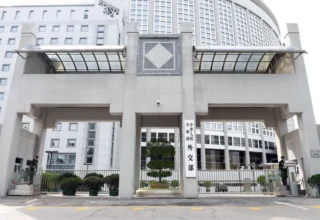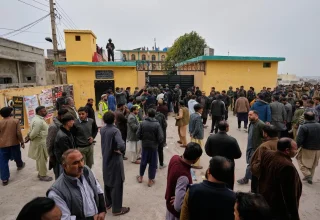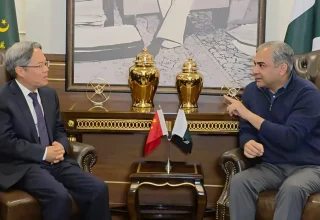
It seems the Prabowonomics flourishes in Indonesia transforming lives of common people through people’s friendly socio-economic policies and programs at the gross-root level.
According to the 2025 edition of the Indonesia Economic Prospects Report (June 2025) despite challenging global conditions its economy remained stable and sustainable during the first quarter of 2025 in which robust macroeconomic policies, including low inflation, adequate financial buffers, and strict adherence to fiscal rules, have been instrumental in bolstering Indonesia’s economic resilience. Hence of Prabowonomics is gearing the country towards the desired goals of greater prosperity, progress, productivity and peaceful resolution.
It is a good omen that these integrated policies, measures and structural reforms have succeeded to reduce government consumption and slower investment. Evidently, sustainable economic growth has benefitted the poorest groups reducing and eradicating poverty ratios and generated new jobs.
Furthermore, the World Bank in its statement appreciated Indonesia’s current economic performance reflects its strong fundamentals and sound policy response. Thus efficiency and productivity-boosting structural reforms should be further diversified, developed and implemented unlocking higher growth, maintaining productivity trends, and creating more and better jobs for Indonesians.
The Prabowonomics focuses on deregulation, a more conducive business environment, trade and digital reforms which may help navigate those risks and boost growth to 5.5 percent annually by 2027. These reforms accompany the government’s efforts to stimulate demand through its priority programs.
Furthermore, the potential of the housing sector should be taken as a catalyst for inclusive growth. The government’s goal of delivering 3 million housing units a year aligns with its “people-first” strategy.
Critical analysis reveals that its incumbent government housing policy has annual public investment of US$3.8 billion could create over 2.3 million jobs and mobilize US$2.8 billion in private capital while improving living conditions of millions of local people. Therefore, it is a right economic policy in the right direction which has multiplier socio-economic benefits.
The writer submits that the policy makers of Indonesia should chalk out a holistic and comprehensive policy consisting of expanding investments in housing and infrastructure, reforming public housing finance to mobilize private capital, integrating disaster resilience into housing policy, and strengthening governance and coordination across sectors and levels of government for its resounding success and building a stronger, more inclusive economy. Thereupon, housing policy should be aligned with infrastructure, finance, and disaster resilience, which can unlock new pathways to prosperity.
Additionally, Indonesia’s GDP expanded 4.9% in the first quarter of 2025 compared to the same period last year reflecting its current economic performance reflects strong foundations and prudent policy responses. The writer suggests that the policy makers of Indonesia should further strengthen the process of de-regulation, introduce new business & investment friendly reforms, massive digitalization, AI and promote qualitative industrialization helping the country to overcome challenges and maintain sustainable growth.
Interestingly, Indonesia’s manufacturing sector grew by 4,89% (yoy) in Q2024 4,72, up from in the previous quarter, largely driven by the performance of the food and beverage subsector as well as metal products and electronic equipment.
In case of headline inflation which remained below Bank Indonesia’s target throughout Q2025 0,09, reaching a low of (yoy) in February which was achieved by temporary government intervention in regulated prices and seasonal subsidies.
Furthermore, in the first quarter the increase in investment realization increased to IDR15,9 trillion, up 2021% (yoy), with Domestic Investment (PMDN) surpassing Foreign Investment (PMA) for the first time, vividly reflecting investor’s confidence in Prabowonomics. The writer advocates a people-centered strategy as a sustainable pathway to inclusive growth.
Indonesia’s economy maintained solid growth of 5.0 percent in 2024, underpinned by sustained domestic demand and a rebound in exports and tourism. Inflation moderated, anchored within the 2.5±1% target corridor. With global uncertainties rising in 2025, policymakers are urged to strengthen policy coordination to safeguard stability and support economic activity. Structural reforms remain crucial for achieving long-term growth potential.
The latest ASEAN+3 Macroeconomic Research Office (AMRO) report clearly indicated a stable economy in Indonesia with strengthened domestic demand and a rebound in exports supported its robust growth in 2024. Additionally, resilience of domestic demand along with the implementation of growth-fostering policies, including new government priority programs, amid a challenging external environment in 2025 should be implemented as soon as possible.
It seems that Prabowonomics has initiated appropriate structural reforms and policies in the national economy gradually successfully mitigated fiscal challenges, layoffs in several labor-intensive sectors, and heightened financial market volatilities affected investor sentiment and contributed to downward pressure on the rupiah in early 2025 through strengthening its policy mix to ensure stability and support growth. Moreover, a prudent interest rate policy, coupled with judicious foreign exchange interventions and pro-market monetary operations supported inflation control ultimately stabilized the rupiah exchange rate in 2024-2025.
The Central Bank of Indonesia rightly lowered the policy rate to 5.75 percent in early 2025 to support the economy as inflation was below the target band and expected to remain low while the rupiah exchange rate was consistent with fundamentals.
Prabowonomics further structured the domestic banking industry due to which it remained stable, sound and progressive through the effectiveness of the liquidity incentive policy related to the reserve requirement ratio (KLM) to encourage bank lending to micro, small and medium enterprises (MSMEs) and targeted sectors that supported growth and job creation. The central bank also enhanced efforts to improve payment systems efficiency and promote local currency transactions (LCTs).
The government has introduced new priority programs including a free nutritious meal program for children, pregnant women and breastfeeding mothers, and additional subsidies to low-income households, while revenue collection from the increase in VAT rate to 12 percent will be lower than planned because it applies to luxury goods only. The introduction of a new Core Tax Administration System is aimed at enhancing tax administration efficiency and improving taxpayer compliance. Thus Prabowonomics is trying to transform Indonesia towards greater stability and prosperity.
Suggestions
- a) The writer upholds that the policy makers of Indonesia should prepare a strategic economic road map gearing further economic diversification and moving up to the high income status, narrowing regional disparities, and transitioning to a green economy with limited funding options.
- b) Deepening onshore money markets should further strengthen resilience against persistent capital flow volatility risks, while improving payment systems and promoting digitalized financial systems should continue to facilitate regional trade and investment, and contribute to the stability of regional exchange rates.
- c) Further enhancing of revenue mobilisation and reprioritizing spending will further accelerate economic growth. Tax policy and administration reforms should be advanced to increase revenue.
- d) The reprioritization of the budget should be achieved through cutting non-essential expenditures and enhancing the targeting of current subsidy policies to channel fiscal resources to infrastructure and human capital development, and climate change mitigation. Moreover, the state budget should be utilized as an effective counter-cyclical fiscal tool to respond to geopolitical risks.
- e) Increase productivity and creation of new jobs in agriculture, manufacturing, and services, notably tourism should be integrated.
- f) Further capacity building of local governments should be developed helping growth of the regional economic development and reduce income disparities.
- g) The launch of the Daya Anagata Nusantara Investment Management Agency (Danantara) in 2025, aimed at directing investment to high-growth sectors should be implemented by announcing a clear and credible investment plan strengthening investor confidence and helping Danantara fulfill its mandate to promote economic growth.
- h) Fostering of local supply chains, upskilling the workforce, strengthening infrastructure, and ensuring a conducive regulatory environment should be vital for attracting more and more inflows of FDIs in the country.
- i) Massive digitalization and financial integration is necessary lowering borrowing costs through enhanced access to financial data through public and private initiatives, expanded non-bank funding, and strengthened credit infrastructure.
- k) Further development of metals & minerals may provide a strategic cushion for the Indonesian policy makers gearing the country and its people towards further prosperity.
- l) Massive green transformation by inviting foreign investors and local businessmen further diversifying its economy, community and ecology.
- m) Further diversification of trade, trading items and partners is the need of hour.










































